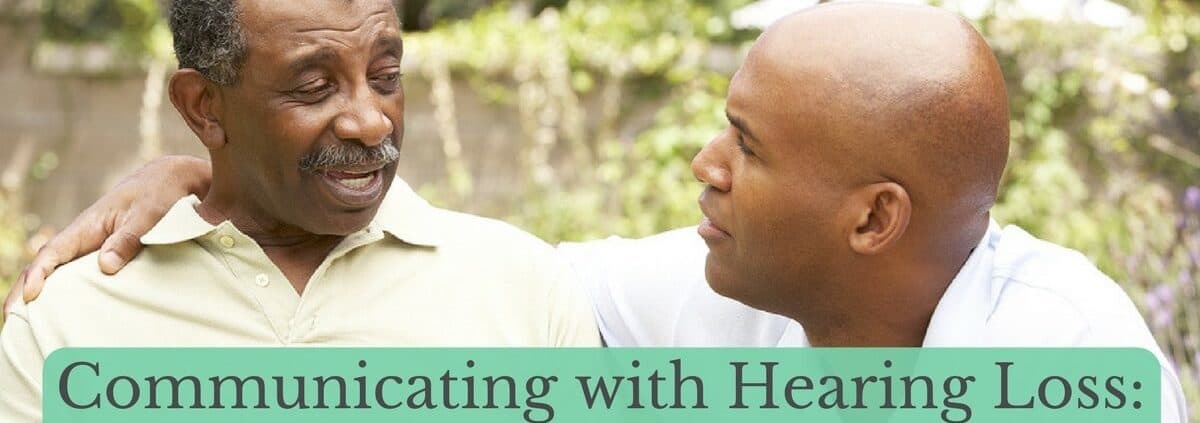Communicating with Hearing Loss: Why Disclosure Matters
Those of us who experience hearing loss or have a loved one who does: listen up! This month of May, we have an excellent opportunity to improve how we communicate. Every year, the American Speech Language Hearing Association (ASHA) celebrates May with Better Speech and Hearing Month, with the goal to raise awareness on communication disorders and hearing loss. This year, the theme is Communication: The Key to Connection.
Hearing loss is the third most common medical condition in the United States, affecting approximately 20% of the population. Regardless of age, hearing loss is often ignored or under treated, which could lead to a decline in quality of life. Hearing loss, left untreated, has been linked to dementia, lower earning power on the job, and most pervasively, an increased risk for social isolation, depression, and anxiety.
Here at Bay Area Hearing Services, we provide comprehensive hearing tests and hearing aid fittings – the first two steps to better hearing health. This month of May, we join ASHA in focusing on communication.
Study: Disclosure Strategies May Improve Communication for Those with Hearing Loss
In 2015, the Massachusetts Eye and Ear conducted a study with 337 people with hearing loss, with a focus on “the language they use with communication partners to disclose their disability.” The goal was to “develop resources for health care professionals to provide their patients with strategies to disclose hearing loss successfully and effectively in interactions with others.”
This study gathered phrases that people with hearing loss used to discuss their hearing abilities. Jessica S. West, one of the lead authors of the study and a sociologist at Duke University, categorized three major categories of disclosure strategies: basic disclosure, nondisclosure, and multipurpose disclosure.
It was determined by researchers that multipurpose disclosure was the most effective way to communicate one’s hearing abilities and needs for accommodation. According to one lead researcher, Dr. Konstantina M. Stankovic, an associate professor of otolaryngology at Harvard Medical School, “We think it can be empowering for patients to know that these strategies, and especially the multipurpose disclosure strategy, are available to them. Hearing loss is an invisible disability; however, asking people to slow down or face someone with hearing loss while speaking may improve communication.
The Three Categories of Disclosing Hearing Loss
West categorized the following three strategies of disclosing hearing loss:
Basic Disclosure
Of people surveyed, basic disclosers tended to disclose their hearing condition and also a few details. For example, a basic disclosure might say, “I’m partially deaf due to an infection I had years ago.”
Nondisclosure
There are people who do not want to or do not feel comfortable discussing their hearing loss. Nondisclosers tended not to mention their hearing abilities at all, but would say something like, “I can’t hear you. Please speak up.”
Multipurpose Disclosure
People who were categorized as multipurpose disclosers simultaneously addressed their hearing loss and provided their communication partners with information on how to accommodate their condition. For example, they might say, “I don’t hear as well out of my right ear. Please walk on my left side.”
Why the Disclosure Strategy Matters When It Comes to Communication
As we all know, healthy communication is the foundation to healthy relationships. Whether it’s a colleague or a spouse, open channels of communication both enrich and grow our most important relationships.
Hearing loss has the potential to undermine communication, as it makes speech recognition difficult. People who experience hearing loss have the common complaint that while they can hear, they do not understand. With the first two methods – basic or nondisclosure – your communication partner and you may have a difficult time. Perhaps frustration may grow because they have to repeat themselves often or you get tired of struggling to hear.
Multipurpose disclosure falls in line with healthy communication. Not only do multipurpose disclosures address – even casually – the condition they experience, they also provide accommodation techniques that their communication partners may employ to better support them.
Treating Hearing Loss is the First Step to Better Communication
Hearing loss affects people of all ages and has many different causes. One of the goals of Better Speech and Hearing Month is to remove the stigma surrounding hearing loss. If you’ve been experiencing difficulties hearing, the first step to better hearing health – and better communication – is to take a hearing test. If a hearing loss is identified, we will work with you to find the right hearing aid to treat you.
If you’ve already addressed your hearing loss and have been fitted for hearing aids, take the next step toward improving communication with your colleagues, friends, and family. For more information and support, contact us at Bay Area Hearing Services today.



